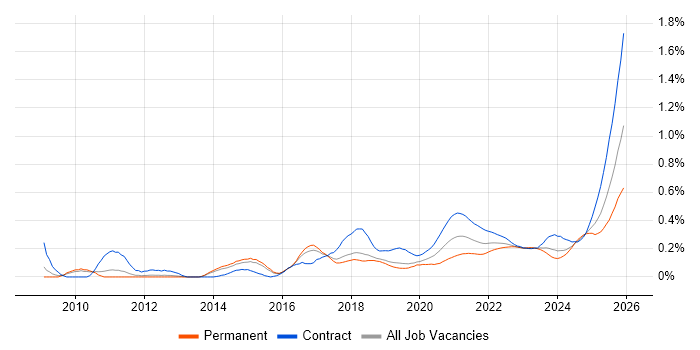Integration Patterns
UK > Work from Home
The table below provides summary statistics and salary benchmarking for remote or hybrid work requiring Integration Patterns skills. It covers permanent job vacancies from the 6 months leading up to 17 December 2025, with comparisons to the same periods in the previous two years.
| 6 months to 17 Dec 2025 |
Same period 2024 | Same period 2023 | |
|---|---|---|---|
| Rank | 291 | 393 | 446 |
| Rank change year-on-year | +102 | +53 | +175 |
| Permanent jobs citing Integration Patterns | 77 | 58 | 37 |
| As % of all permanent jobs with remote/hybrid work options | 0.50% | 0.33% | 0.19% |
| As % of the Processes & Methodologies category | 0.56% | 0.36% | 0.20% |
| Number of salaries quoted | 50 | 29 | 24 |
| 10th Percentile | £57,480 | £55,885 | £52,500 |
| 25th Percentile | £66,625 | - | £56,875 |
| Median annual salary (50th Percentile) | £77,500 | £70,000 | £70,250 |
| Median % change year-on-year | +10.71% | -0.36% | -17.35% |
| 75th Percentile | £95,000 | £77,500 | £90,000 |
| 90th Percentile | £105,000 | £140,000 | £126,000 |
| UK median annual salary | £77,500 | £75,000 | £70,000 |
| % change year-on-year | +3.33% | +7.14% | -12.50% |
All Process and Methodology Skills
Work from Home
Integration Patterns falls under the Processes and Methodologies category. For comparison with the information above, the following table provides summary statistics for all permanent job vacancies with remote or hybrid options requiring process or methodology skills.
| Permanent vacancies with a requirement for process or methodology skills | 13,685 | 16,295 | 18,758 |
| As % of all permanent jobs with a WFH option | 89.13% | 92.57% | 94.97% |
| Number of salaries quoted | 8,775 | 9,910 | 15,077 |
| 10th Percentile | £30,000 | £36,250 | £36,250 |
| 25th Percentile | £40,549 | £46,250 | £46,306 |
| Median annual salary (50th Percentile) | £57,500 | £62,500 | £61,000 |
| Median % change year-on-year | -8.00% | +2.46% | -2.40% |
| 75th Percentile | £78,750 | £81,250 | £80,000 |
| 90th Percentile | £100,000 | £100,000 | £97,500 |
| UK median annual salary | £55,000 | £60,000 | £60,000 |
| % change year-on-year | -8.33% | - | -2.44% |
Integration Patterns
Job Vacancy Trend for Remote/Hybrid Jobs
Historical trend showing the proportion of permanent IT job postings citing Integration Patterns and offering remote or hybrid work options relative to all permanent IT jobs advertised.

Integration Patterns
Salary Trend for Remote/Hybrid Jobs
Salary distribution trend for jobs with remote/hybrid work options citing Integration Patterns.

Integration Patterns
Salary Histogram for Remote/Hybrid Jobs
Salary distribution for jobs with remote/hybrid work options citing Integration Patterns over the 6 months to 17 December 2025.
Integration Patterns
Co-Occurring Skills & Capabilities in Remote/Hybrid Jobs by Category
The following tables expand on the one above by listing co-occurrences grouped by category. They cover the same employment type, locality and period, with up to 20 co-occurrences shown in each category:
|
|
||||||||||||||||||||||||||||||||||||||||||||||||||||||||||||||||||||||||||||||||||||||||||||||||||||||||||||||||||||||||||||||
|
|
||||||||||||||||||||||||||||||||||||||||||||||||||||||||||||||||||||||||||||||||||||||||||||||||||||||||||||||||||||||||||||||
|
|
||||||||||||||||||||||||||||||||||||||||||||||||||||||||||||||||||||||||||||||||||||||||||||||||||||||||||||||||||||||||||||||
|
|
||||||||||||||||||||||||||||||||||||||||||||||||||||||||||||||||||||||||||||||||||||||||||||||||||||||||||||||||||||||||||||||
|
|
||||||||||||||||||||||||||||||||||||||||||||||||||||||||||||||||||||||||||||||||||||||||||||||||||||||||||||||||||||||||||||||
|
|
||||||||||||||||||||||||||||||||||||||||||||||||||||||||||||||||||||||||||||||||||||||||||||||||||||||||||||||||||||||||||||||
|
|
||||||||||||||||||||||||||||||||||||||||||||||||||||||||||||||||||||||||||||||||||||||||||||||||||||||||||||||||||||||||||||||
|
|
||||||||||||||||||||||||||||||||||||||||||||||||||||||||||||||||||||||||||||||||||||||||||||||||||||||||||||||||||||||||||||||
|
|||||||||||||||||||||||||||||||||||||||||||||||||||||||||||||||||||||||||||||||||||||||||||||||||||||||||||||||||||||||||||||||
